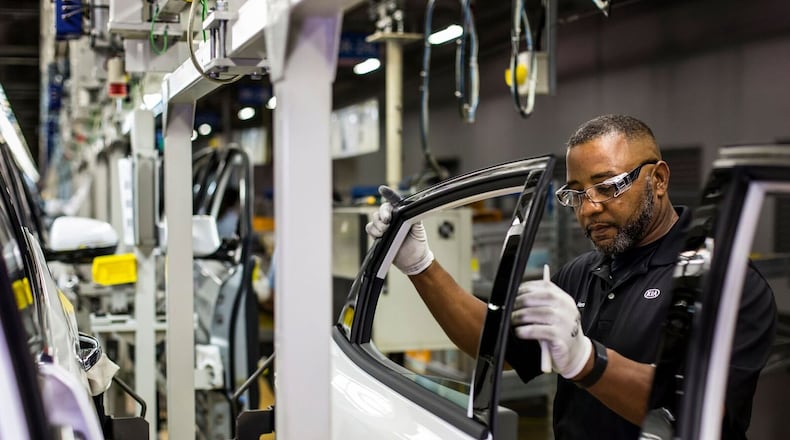With Georgia’s shelter-in-place order lifted, more restrictions on businesses removed and two large manufacturing plants restarting this week, the state’s economy is open.
But normal is not yet within reach.
Predictions too are tough since uncertainty is everywhere: the coronavirus pandemic’s course, consumer willingness to return to public spaces and government’s ability to support spending. Even many of Georgia’s largest companies, including UPS and AFLAC, have withdrawn their financial projections for the rest of the year.
The essential keys to economic recovery are in medicine and psychology, said the state's fiscal economist, Jeffrey Dorfman of the University of Georgia.
"First, we need a vaccine or an effective treatment for COVID-19," he said. "Second, we need consumers to feel safe frequenting businesses."
The proof of recovery will rest in “the number of people shopping, dining, visiting restaurants, getting their hair done, and going to the dentist,” Dorfman said.
There are signs, at least, of attempted normalcy. Many manufacturing plants have remained open during the pandemic — and some of those that closed are reopening.
The 2,000-worker Toyo Tire Holdings plant in White planned to reopen Sunday. “Our plan is to bring back all of our employees on a revised shift schedule,” said a spokesman.
In West Point, the 2,700-worker Kia Motors Manufacturing Georgia plant restarts its assembly line Monday, according to Rick Douglas, senior manager for team relations.
Kia, the only auto assembly plant in the state, said when it closed in late March that it was having trouble getting the parts it needed. Consumer demand for vehicles plunged during the crisis, but the South Korean-based company was also more dependent on foreign suppliers than some factories.
Most businesses were allowed to stay open during Gov. Brian Kemp's shelter-in-place order, which went into effect April 3 and expired April 30. Almost all of the businesses that had been ordered shut, including hair and nail salons, gyms and bowling alleys, were allowed to reopen April 24. Restaurants were allowed to reopen dining rooms April 27. Some shopping malls began reopening Friday.
Moreover, many sectors in the economy are finding they can work without in-person meetings.
A survey of office professionals in late April by staffing company Robert Half showed 82% of businesses willing to allow employees to work from home more often. Robert Half itself has continued to do business with its 100 Georgia employees working from home.
But no one expects the economy to rebound as quickly as it crashed. Businesses are still required to maintain social-distancing measures, curbing traffic. Many experts warn that a rapid return to work and schools would only fuel another deadly wave of the coronavirus.
And no recovery comes without workers and households, many now struggling to pay their rent after mass layoffs. The state Department of Labor has processed nearly 1.5 million jobless claims since mid-March. Georgia's unemployment rate, which was at a historic low of 3.1% in February, is expected to be four or five times as high when the April report is issued in a few weeks.
Some companies are hiring: Amazon is adding workers, as are delivery services like Instacart and grocery stores like Publix and Kroger. Amazon also said it will build an 800-worker distribution center near Augusta.
So far, the number of new jobs is just a fraction of those lost.
To keep households temporarily afloat, new federal law has made new classes of workers eligible for unemployment insurance, including gig and contract workers and the self-employed. Congress also approved a weekly $600 supplement for unemployed workers.
But many of those people are still waiting: it takes an average of 28 days from a jobless worker filing for benefits for the state Department of Labor to make his or her first payment. That too, will slow any recovery.
As the economy heals, the number of workers continuing to receive jobless benefits will drift down, said Rajeev Dhawan, director of the Economic Forecasting Center at Georgia State University. "That will tell me if we have turned the corner."
But it’s long slog around the track, since many economic events are planned many months in advance, Dhawan said.
The bad news about the coronavirus has already forced cancellations or postponements of business conferences, trade conventions, travel and family vacations that had been planned for the summer.
So what Georgians are coping with now has a long lag time in the economy, he said. “If you want to have a good September or October, if you want a strong fourth quarter, you need the good news now.”






